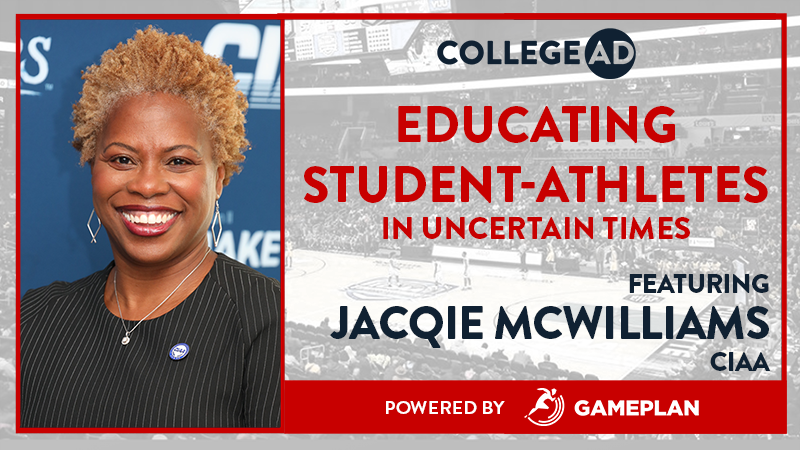
“As a commissioner my role in working with our presidents, our athletic directors, our student-athletes, and then sponsors. We are in the center of what education could look like on a bigger picture for the conference.” -Jacqie McWilliams
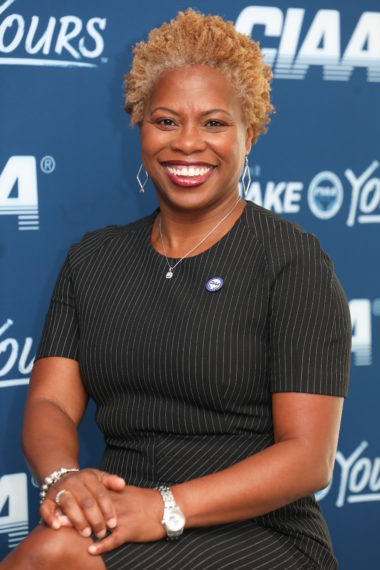 Jacqie McWilliams is the third full-time Commissioner of the Central Intercollegiate Athletic Association (CIAA). She knows her role is an important one, one that unites everyone behind the student-athletes.
Jacqie McWilliams is the third full-time Commissioner of the Central Intercollegiate Athletic Association (CIAA). She knows her role is an important one, one that unites everyone behind the student-athletes.
“I’m blessed to work for presidents who value college athletics and see it as a part of the educational experience. Even as conference commissioner, as we even worked on our strategic plan, it wasn’t just about the sport.”
McWilliams sees her role as providing the student-athletes an opportunity to use sports as a tool to have many fulfilling life experiences.
“It’s career development, learning financial literacy, community service, understanding the value and roles of leadership and giving student-athletes access and opportunity to leadership development. For the CIAA there is also understanding the value in the history of their education and why it’s so important for them to value the opportunity as a student-athlete, based on the founding and the grounding of the institution that they selected. It’s a holistic thought process of what your athletic experience looks like. I think across conferences, we’re trying to be thoughtful given that we are the mediator for everybody who is part of the enterprise.”
In a typical year, Jacqie McWilliams has a tough job, but 2020 has been especially challenging. She explains that communication has always been a top priority and that has helped keep the CIAA and its institutions on track.
“Our conference does a really good job in communicating. We can see and anticipate needs before it even happens. I think as a leader, it’s my responsibility to be thoughtful and to think those things out before they even say it.”
She knows the allocation of resources is always going to be an issue across athletics, so she remains mindful of what the conference can do for its members.
“We’re big on raising money to give back scholarship distribution. So anytime we can help support that we do so. Leadership development programs Division II has a unique opportunity to have grant dollars. So, we’re very thoughtful in including our membership in thinking through what our priorities are and how we can help you offset costs or provide opportunities.”
She gave an example of the CIAA Sports Network, which is a streaming platform. The CIAA paid for half of the cost for each institution in the first year to make sure that everyone had what they needed.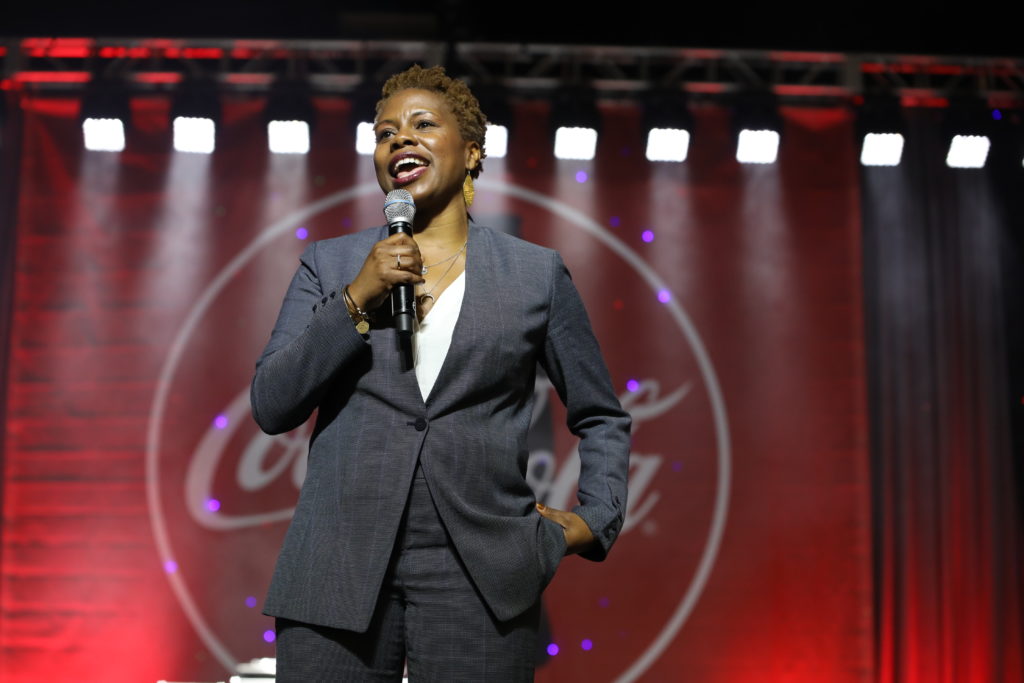 Jacqie McWilliams believes every decision she makes will ultimately benefit student-athletes at a personal level.
Jacqie McWilliams believes every decision she makes will ultimately benefit student-athletes at a personal level.
“As a former student-athlete, a former coach, a former administrator in the conference before, there are things that I can feel and see before others do because of my own experiences. I try to be strategic and I understand I can put myself in the shoes of every single person in our conference. It’s truly servant leadership. You have to put yourself in the eyes, in the hearts of others that you’re serving and not yourself.”
Using that approach, she has seen the challenges of the pandemic through a lens of opportunity.
“I’ve said since March 16th, whenever we closed and stayed home, this is where you’ll see leaders. Leaders respond and not react. Leaders strategize and take advantage of the opportunity of what this looks like now. Is it scary? Absolutely. But I think our conference has been through enough challenges to know how to lead.”
She has encouraged her board to take advantage of any opportunities that might present themselves, even as they had to cancel and make concessions during the pandemic.
“This is tough. Our championship for football would have been this past Saturday and I’m telling you; I woke up and my heart felt heavy. You’re having to think differently about where I can put that energy. We’re not out on the field, but where can we put it to still make a difference in the lives of the people in this conference? And it’s not just our student-athletes, our alumni and sponsors and partners are biting at us and asking is the basketball tournament going to happen? Are hotels available? I told my staff in our staff meeting, if we want to survive, then we have to think differently.”
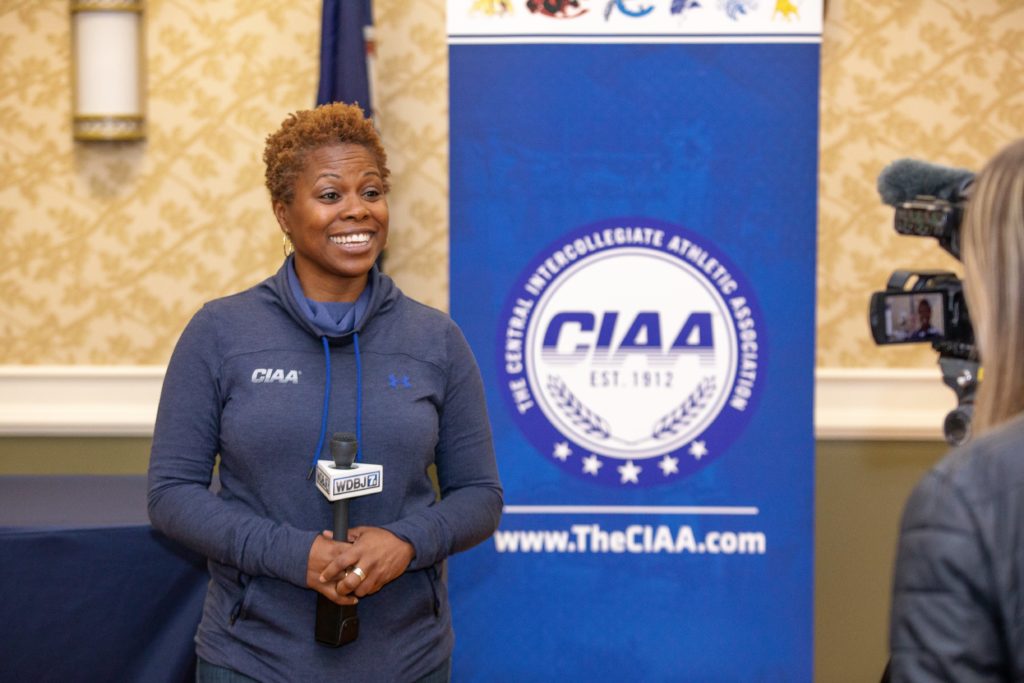 The one aspect of the unusual year that has been a particular challenge for Jacqie McWilliams and her team has been the financial situation. However, she believes it’s the conference’s resourcefulness and ability to pivot that will keep them afloat.
The one aspect of the unusual year that has been a particular challenge for Jacqie McWilliams and her team has been the financial situation. However, she believes it’s the conference’s resourcefulness and ability to pivot that will keep them afloat.
“Every day I am constantly thinking, how do we continue to navigate in spaces of the unknown and stay relevant? That’s what keeps me up, but we just get through every day. Every night I just pray God lets tomorrow still be okay.”
McWilliams explains that the response from partners and sponsors has been positive. Many of the CIAA sponsors have a decades-long partnership with the conference.
“We’ve been really fortunate; we’ve had some long-standing partners that have been with us for almost 50 years. Nationwide Toyota has been with us for over 29 years. We’ve seen changes in their organizations where we’ve had to be flexible. I believe because we see the value in each other and our missions align well and the communities that we’re impacting, we do it well together.”
Throughout everything that 2020 has thrown at college athletics, Jacqie McWilliams is able to keep her focus on the student-athlete. She says their determination and spirit has given her a lot to be grateful for.
“I think that’s important to remind our membership and our staff and our board, the good stuff that we are doing, even in the midst of COVID. I have a lot of gratitude. Our student-athletes and our student-athlete advisory committee, they inspire me. They understand the decisions that we make because we keep them in the midst of those decisions.”
She explains that the student-athlete advisory committee exemplifies the leadership for their conference.
“They know how to project their voices. They know how to organize their conversations. They’re intentional about what they want and what they need. And we’re intentional to help them strategize on their campuses with their presidents and with us. I’m proud of that.”
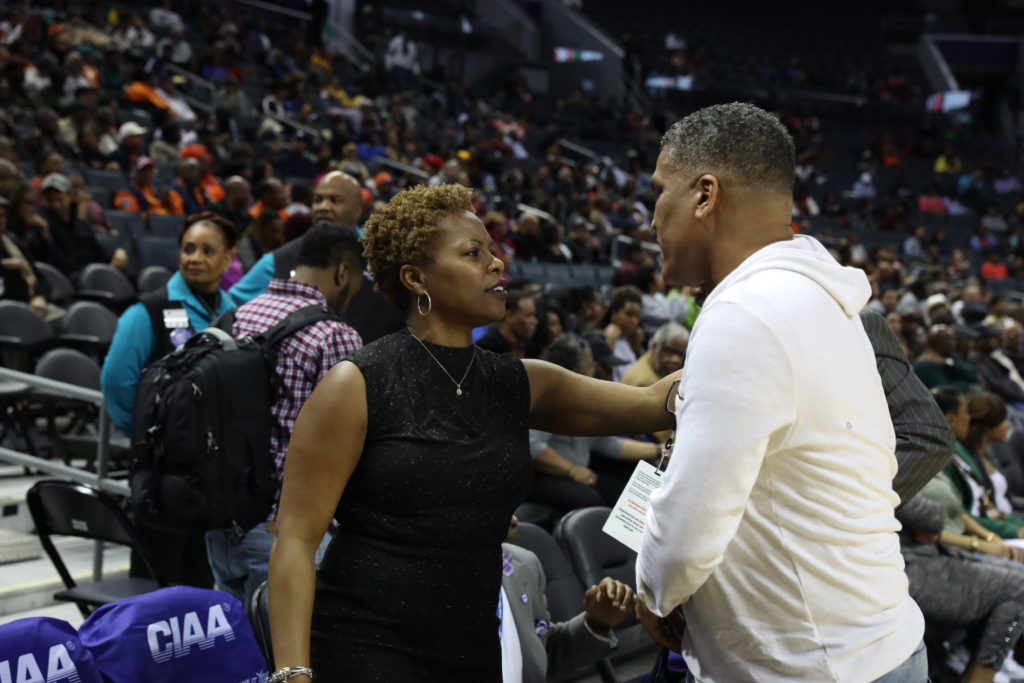 McWilliams and her team started the Mac Attack show as a way to keep everyone associated with the conference engaged during the pandemic. She explains many student-athletes want to see and experience HBCUs and the Mac Attack show has made perspectives on that experience accessible.
McWilliams and her team started the Mac Attack show as a way to keep everyone associated with the conference engaged during the pandemic. She explains many student-athletes want to see and experience HBCUs and the Mac Attack show has made perspectives on that experience accessible.
“We started Mac Attack during COVID. Every Monday we do interviews and really connect with our community. I’ve enjoyed every bit of it because it has allowed us to talk about issues that allow us to get to know our students a lot better. I love this conference for so many different reasons. The cultural experience, whether you’re white, black, red, international, it doesn’t matter. There’s a sense of love and family in this conference. If you are a white student or Hispanic student that comes to our school, there’s nothing but love in our conference.”
Making the CIAA a place everyone feels elevated and engaged is something McWilliams works towards every day of her tenure.
“College athletics is this unique space. When student-athletes select their institutions of choice, they have to go with what’s going to give them the best overall opportunity and experience. Athletics is a component, education is a component, but your spiritual and social welfare is just as important. Lincoln in Pennsylvania or Claflin in South Carolina have different educational systems, different locations, different places, different experiences. But at the end of the day, we all have that one opportunity and that’s to give students a chance to perform and to be their best selves while they’re playing their game and getting their education.”
She says that’s why she loves talking about her conference, they’ve created a place for student-athletes to thrive.
“I work for a board that allows me to give my best self every single day. And I know what it feels like to fight through that. It’s important that we all allow people to be their best selves every day in college athletics. This is one place that draws communities to be their best selves on the field. Then we work hard to show them how to be their best selves when they get off the field.”
